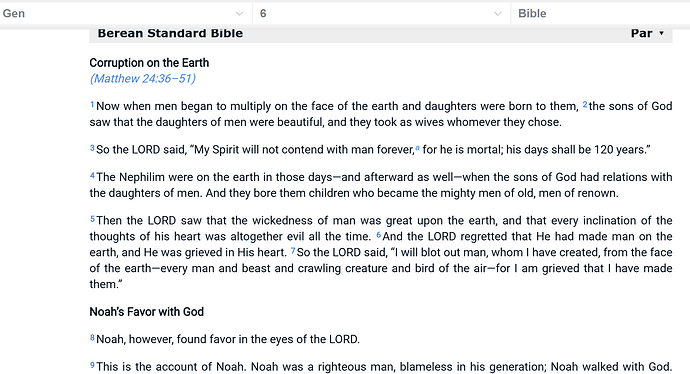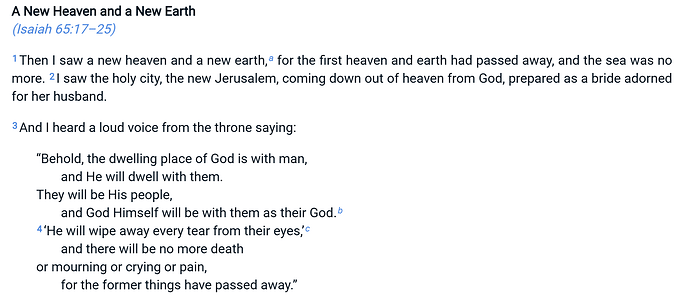certainly the two are essential of that there is no doubt
However, I do not agree that faith and science are necessarily a dichotomy. I take a far more positive approach to the issues at hand, that we can find solutions to the perceived objections, that science can fit the bible (thing is, we cant change the bible)
Its Gods direct revelation to us via his patriarchs/prophets/kings/Messiah/Apostles.
In the ANE realm, it demonstrably is a dichotomy. I can say demonstrably because ANE regularly reinterprets, re-translates, re rewrites scripture in order to make the bible understanding fit with what science apparently says is true historically. The thing is, science doesn’t say anything, it doesn’t interpret anything…we do, and we are good at jumping on bandwagons that suit our ideas…we form collectives of like-minded individuals, we even form entire cultures around such beliefs. Interpretations are the source of beliefs…even for the scientist.
For me, the problem there is that the idea of science is absolute, this is a modern approach that presents some seriously deficient theological problems…it causes enormous inconsistencies within the Christian religion that is made even worse when some of the best scientific minds make the following statements:
Charles Darwin
Stephen Hawking
We cannot ignore the following facts:
Christ clearly says “as in the days of Noah, a flood come and swept them all away” (directly referencing Genesis 6 and 7 claim that “all living things that creepeth on the earth were wiped out” …it clearly says of humanity, that it was only Noah and his immediately family who were on the ark that survived.
Christ makes reference to the Genesis flood account as a global event in the same context as he is talking about the Second Coming as a global event.
A localised flood event is not supporting the kind of worldwide event the Second Coming is prophesied to be. So for the Christian, it is impossible to ignore that evidence of faith despite what some naturalists choose to assemble in an alternative world view.
The overriding biblical theme is quite clearly global/universal:
-
God creates a world and Mankind (global event)
-
God destroys life on this planet because of corruption. The corruption is global, not local)
-
God sends His own son to provide an avenue for salvation for all mankind (global, not local)
God even told us he was going to do this in Genesis Chapter 3 (global, not local)
-
God foretells us of the Second Coming in Luke 21 (clearly global, not local)
-
A new Heaven and New Earth in Revelation 21 (clearly global/universal…not local)
The bible is full of local stories/experiences, that is certain. However, these stories are to teach global/universal truths and the difference here is that they are being cited in such a way as to make it easy for us to know that they are local/individual events. A common reading of language demonstrates quite clearly to us that we know the difference. God does not demonstrate in the bible the notion that he is intent on not being able to understand; there is always an interpreter who resolves that dilemma for us at the appropriate time. The thing is, the bible canon was completed 1500 years ago…there is not further translation beyond its pages.
I will finish with quote from Fred Hoyle - particularly love the first one…the idea that God has the capacity to play with and even make a laughing stock of what humanity considers are immutable laws of reality.
Fred Hoyle highlights the stupidity in human reasoning here I think:
To God, science is insignificant. To ANE it is a pedastool. As a YEC, i do not face that dilemma. My science fits the bible without inconsistency in theology (which is inherent in the bible story and history). The Bible is already Gods revelation in human language…it quite explicitly explains that…the notion of ANE that it must be reinterpreted is not only wrong, its antibiblical.
Google AI summary of how we know the Bible does the interpreting
- The Principle of Context:
- The Bible is a cohesive body of literature with a clear narrative and overarching theme. Understanding a particular passage requires considering its context within the broader biblical narrative, including its historical, cultural, and literary setting.
- This means that understanding a verse in isolation can lead to misinterpretations. By comparing and contrasting different passages on the same topic, one can gain a more accurate and comprehensive understanding of the Bible’s teachings.
- The Use of Repetition and Amplification:
- The Bible often repeats key concepts or themes in different contexts, providing a more thorough explanation and emphasizing the importance of these ideas.
- By comparing these different repetitions, one can gain a deeper understanding of the meaning and application of these concepts.
- The Role of Jesus as the Interpreter:
- In the New Testament, Jesus is presented as the ultimate interpreter of the Old Testament. He explains the Old Testament prophecies and laws, demonstrating how they apply to the new covenant and his own person and ministry.
- This suggests that the Bible should be understood in the light of Christ, and that the Old Testament foreshadows and finds fulfillment in the New Testament.
- The Authority of Scripture:
- The Bible claims to be God’s Word and therefore infallible. This implies that the Bible is capable of accurately conveying God’s message and that its teachings are consistent and reliable.
- If the Bible were not capable of self-interpretation, it would undermine its own authority and trustworthiness.
- The Role of the Holy Spirit:
- The Holy Spirit is believed to guide believers in understanding the Bible. The Holy Spirit helps believers to discern the true meaning of the text and to apply it to their lives.
- The Holy Spirit’s role in guiding believers in understanding the Bible reinforces the idea that the Bible can be understood through careful study and prayerful contemplation, rather than relying solely on personal interpretations.











